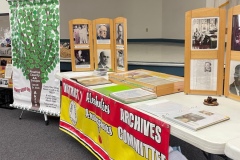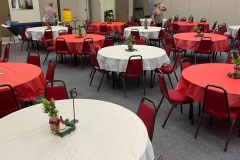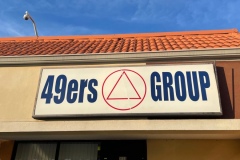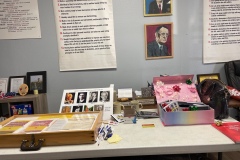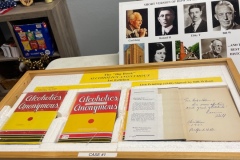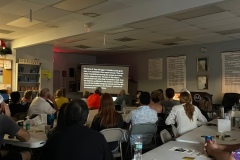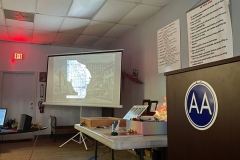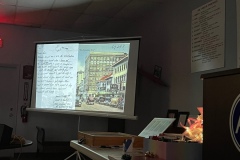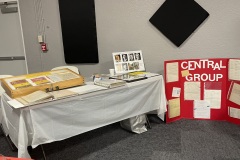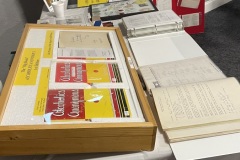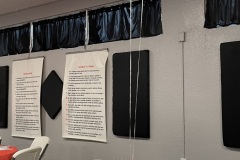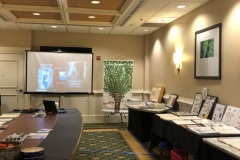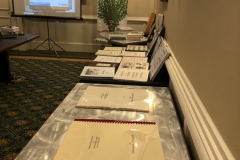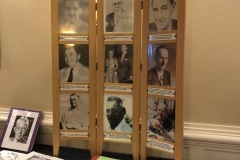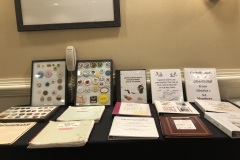Archives Service
The Traveling Board is our way to carry the message of A.A. and Pinellas County history.
Archives Committee will present an event to your home group with displays, videos and power points of interesting facts on how it all began in our area.
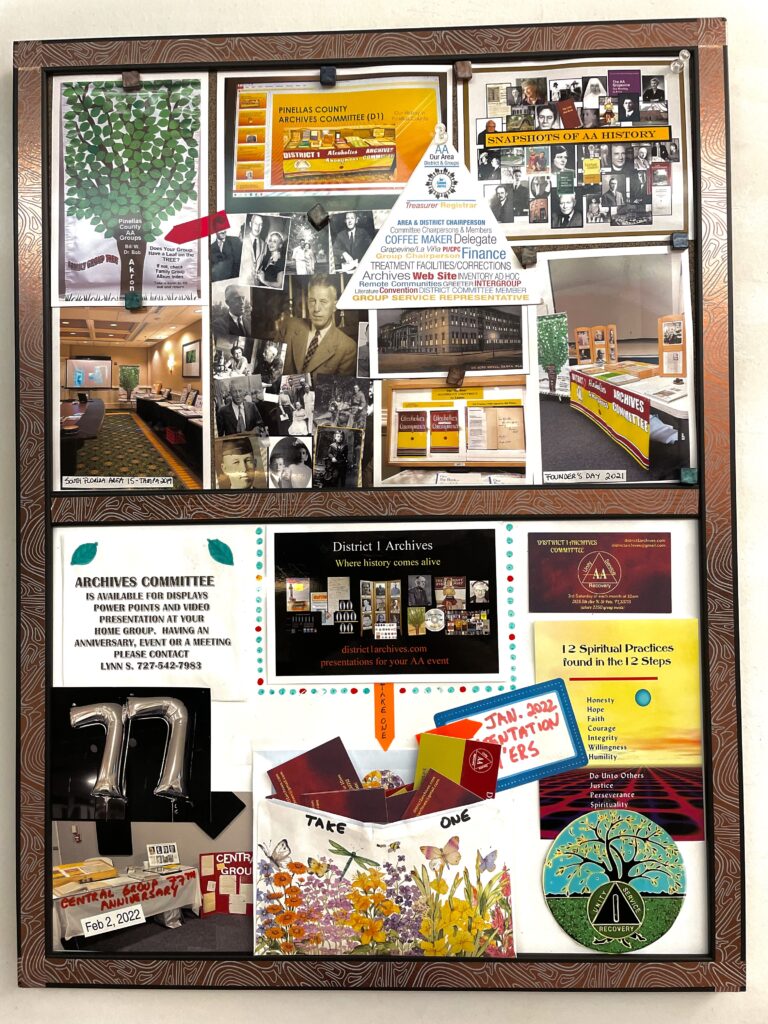
“We are trying to build up extensive records which will be of value to a future historian. It is highly important that the factual material be placed in our files in such a way that there can be no substantial distortion. We want to keep enlarging on this idea for the sake of the full length history to come.
— Bill Wilson, 1957
Like any other AA service, the primary purpose of those involved in archival work is to carry the message of Alcoholics Anonymous. Archives service work is more than mere custodial activity; it is the means by which we collect, preserve, and share the rich and meaningful heritage of our Fellowship. It is by the collection and sharing of these important historical elements that our collective gratitude for Alcoholics Anonymous is deepened.
A.A. members have a responsibility to gather and care for the Fellowship’s historical documents and memorabilia. Correspondence, records, minutes, reports, photographs, newspaper and magazine articles from the past and the present should be collected, preserved, and made available for the guidance and research of A.A. members and others (researchers, historians, and scholars from various disciplines)—for now and for generations to come.
District 1 Archives Committee draws on multiple sources to guide our service and carry the AA message. Both the AA Archives General Service Board Directives, Statement of Purpose and Mission Statement, and the Area 15 Archive General Service Committee updates help to drive our best archival practices.
Our local AA experience, strength and hope is an invaluable element of sharing the AA message. Maintaining our AA historical collection—from the GSO to District 1 at the local level—requires the dedicated service of many willing AA’s.
- The archivist (the “collection manager”)
- The historian (the “interviewer”)
- Plain and Straight Liaison (Monthly Archives stories and Trivia Questions)
- Group Liaisons who participate on projects, in monthly meetings and update their home groups
- Chairperson, a trusted servant who chairs regular monthly meetings as well as participates in GSO and other meetings
- Many additional roles and needs for all skill levels. Your District 1 Archives Committee members are AA’s with various skill levels, areas of expertise and interests, with a wide range of lengths of sobriety. None of us are librarians or history professors! We are, however, creative, vibrant, collaborative, inquisitive and most of all, happy to be of service as members of AA. “Whatever you do at your local level, you do for all of AA.” (GSO Archives Workbook, pg 30)
Just as changing technology changed our everyday lives: from the daily newspaper to the internet, from telegrams and snail mail to Facebook and Instagram, from records and reel-to-reels to Pandora and Spotify, District 1 Archives has changed and accommodated up-to-date technologies.
- Hundreds of hard copies have now been digitized or converted to archival discs.
- Rare early “old timer” interviews have been converted to archival disc formats.
- Viewing and sharing our District 1 preserved histories is as easy as hitting a hyperlink! (Although we still do road shows and have a travelling archives board and other cool stuff.)
- But there’s a lot of work required to get there… and we could use your help
The only requirement for membership in the AA District 1 Archives committee is a desire to be of service. Archives service opportunities are always available, and all skill levels are welcome. We continue to build and communicate our District 1 legacy: What were we like before, and how did we get to where we are now? Preserving and sharing our local AA history, built of common experiences over the long term, is another reminder that we are trudging a well-trodden path with those who carried the message before us. Service opportunities include (but are not limited to the following):
- Lynn’s list of positions?
- Does your home group have a recorded history? Does it have a leaf on our District 1 Tree? You can start your Archives service journey by researching (find the tree on the website!) and collaborating with your own home group by collecting your group’s history and submitting to archives for inclusion (contact archives for assistance). Hey, get a leaf!!!
- Do you have a great brain for trivia? Research and forward any AA trivia Q&A’s to our site (see ______). We may use it at a travelling presentation or in the Plain and Straight!
- Inquire about our travelling Archives board. Your home group can submit a request to share the message of our own District 15 experience, strength and hope.
Jack Alexander’s letter to the Saturday Evening Post in March of 1941, was widely read and “largely responsible for the surge of interest that established the Society on a national and international basis.” (AA P-12 pamphlet, pg 5)
- What was the similar local impetus and who or what was the spark? Did they have a contact list in their cell phone? If not, how did they organize, form and thrive?
- What was the first District 1 group? Can you find these answers in these pages?
These are all examples of the service opportunities available on the District 1 Archives Committee. Please see the _____ page to join us at our next meeting and see how you too can be part of our journey.
District 1 Archives Committee Composition:
Archives Committee Standing Positions: Qualifications and Responsibilities.
Chair/Treasurer: The Archives Chairperson also serves as Treasurer, combining the two positions eliminates a middle person when requesting funds from District.
1. Term 2 years
2. 2 years continuous sobriety. May be waived if deemed acceptable by the Archives Committee.
3. Leads monthly Archives Committee meetings.
4. Responds to sender acknowledging receipt of email message.
5. Represents the Archives Committee at various District functions.
6. Presents reports at District and Area meetings.
7. Prepares annual budget for Archives Committee expenses.
8. Requests funds from District as needed.
2. 2 years continuous sobriety. May be waived if deemed acceptable by the Archives Committee.
3. Maintains a roster (name, email address and phone number) of active Committee members.
4. Emails monthly meeting minutes to members in a timely manner.
5. Emails a meeting reminder to all members on the roster 4-5 days prior to next meeting.
2. 5 years continuous sobriety. May be waived if deemed acceptable by the Archives Committee.
3. Must have good organization skills and detailed-oriented.
4. Is responsible for organizing, updating and maintaining an inventory of materials in the collection. Arranges for the orderly removal and return of display materials.
5. Upon receipt of a donation, completes donation receipt and fulfills duties.
6. Archives digital copies of the Plain & Straight.
7. Archives digital copies of monthly Archives Committee meeting minutes.
A traveling display may include the following:
2. A display case and binders.
3. Group family tree w/stand.
4. Binder containing Group history forms
5. District 1 Archives banner.
6. Traveling Board if appropriated to the event.
2. Try to arrange a quiet location free of distractions, perhaps someone’s home.
3. Be certain that the member being interviewed read and sign the Interview Waiver Form.
4. Before you begin recording, explain to the member that our primary interest is in A.A. role in the person’s story. The emphasis should be on sobriety rather than drinking. The member may want to begin their story with their original contact with A.A.
5. Begin the recording by identifying yourself and giving the date. Then introduce the member.
6. The member may want to simply reminisce. If, however, they prefer to answer question, the Archives has prepared a list of suggested questions.
a. Sobriety date.
b. How did you get sober?
c. How did you learn about A.A.?
d. When and where are your first actual contact made with A.A.
e. Did you have a sponsor? If so, how did it help you as a newcomer?
f. Who were the people especially prominent in your sobriety?
g. Your first home group?
h. Who were the founders and group officers of early groups?
i. What special occasions do you recall? (Start a new group, assemblies, conventions, etc…)
j. Did you get into Service? If so, how deeply?
k. When was A.A. started in your original place of sobriety?
l. What was A.A. like then?
m. When did you move to District 1?
n. When you come to District 1, what difference did you see?
Alternate Chair: Requirement same as Chair. Fills in for the Chair necessary.
Secretary: Records minutes of Committee meetings.
1. Terms 2 years
Archivist: Responsible for the Archives collections, including documents, books, recordings and artifacts. Maintains the physical integrity of the collection and also develops an index, inventory and a practical means of searching the collection.
1. Term indefinite. Non-rotating.
Alternate/Assistant Archivist: Same as Archivist.
The following positions have no minimum sobriety requirement.
Plain & Straight Liaison: Submit monthly articles about A.A. history to the Plain & Straight.
Website Liaison: Maintain the District 1 Archives website; posts material as needed and post minutes monthly on website.
Biographer: Schedule and Record on CDs interviews with local long-timers. Submits recordings to Archivist.
No-Show:
If a Committee member holding a position does not attend two (2) consecutive monthly meetings, and does not communicate with the Committee, the position will be considered vacant.
Procedure:
The Committee holds meetings every 3rd Saturday of each month at 10am. The Secretary reads last month minutes, Committee standing members reads their reports. Chairperson reports and discuss accepted motion(s) submitted by D1 General Service Business meetings, discuss new business pertaining to Area 15 agendas, website adding materials and rearranging and preparing for display presentation when invited. Everyone is welcome to attend the Archives Committee meeting.
When the Archives Committee receives an invitation to do a display, it must be approved by the Committee in advance. The Archives Committee does not pay admission/registration fees to attend a function or order to do a display. However, if individual members are planning to attend and are willing to accept responsibility for the materials, an invitation may be accepted.
1. One or more of the wooden tri-fold photo displays
Pertaining to all displays: The material must not be left unattended. The room must be locked anytime no attendant is present. This is particularly important for large and multiple-day events, such as conventions. Adequate supervision (people to monitor things) must be arranged in advance.
District 1 Group Family Tree: For a group to be represented by a leaf on the Group Family Tree, a Group Form must be file with Archives Committee. Forms may be obtained online from the Archives website or from an Archives Committee member.
Biographer Guidelines for interview and recording members of archival files: The purpose of recording members is to memorialize the recollections of senior District 1 members with emphasis of their memories of how A.A. was practiced when they first came to District 1. We want this to be a comfortable experience for everyone involved.
1. Interview should be no more than 1 hour, after editing. Anything under that is fine, depending on who long the member wishes to speak.
Archivist: Requirement for storing Archives Collection:
1. Climate controlled 24/7.
2. Pest controlled.
3. Secure.
4. Reasonable accessible.
Collection Scope: District 1 Archives acquisition priorities include, but are not limited to:
1. Group histories.
2. When and Where.
3. Local event flyers: conventions, picnics, anniversary or special meetings, new meetings, etc.
4. Relevant correspondence.
5. Written or recorded histories of long-time members.
6. District 1 General Service Business meeting minutes (forwarded annually by District Secretary).
7. Display items including:
a. Books.
b. Pamphlets.
c. Newspapers articles.
d. Photographs.
e. Group Family Tree
f. Other appropriate artifacts.
Acceptance of Donated Materials: Following are the guidelines for accepting a donation.
1. Any donation accepted commits the Committee to the task of organizing and preserving it, which involves hand work and archival material costs.
2. Any prospective donation that would require expensive conservation, special housing, intensive processing, or other extensive demand on Archives resources may not be accepted.
3. If a monetary appraisal is desired by a donor, it is recommended that is be done by a disinterested third party before title of the material is transferred to District 1 Archives.
4. District 1 Archives does not purchase archival records, books, or artifacts.
5. District 1 Archives generally does not accept items on loan.
Retention & Deaccession: District 1 Archives reserves the right to reevaluate historical material and to carefully and judiciously deaccession and dispose of certain items from its collection consistent with professionally accepted standards. An item may be deaccessioned if any of the following conditions exits:
1. In most cases, a maximum of three copies of any item will be retained.
2. The item is not relevant to Alcoholic Anonymous or to the District 1 mission and scope.
3. The item has deteriorated beyond usefulness.
4. District 1 Archives is unable to continue to provide care and storage for the object.
5. The item may be replaced with a similar object or greater significance, quality, and/or in better condition.
6. The item is subject to legal and ethical standards requiring its removal. Complete records will be maintained on all deaccessioned items and their subsequent disposition.
Disposal of Deaccessioned Items: Deaccessioned items may be disposed of by one of the following method, in decreasing order of desirability:
1. Return to original donor
2. Transfer to another Alcoholic Anonymous repository: offer to another District Archives in Area 15.
3. Donation to an appropriate non-A.A. archive or scholarly institution.
4. Destruction of the item.


